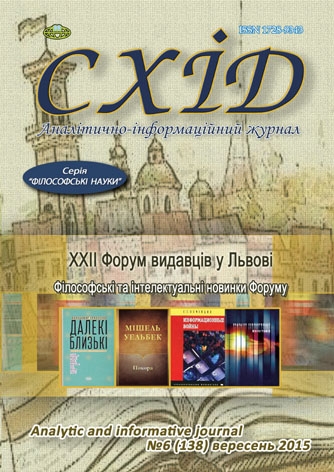Punctum saliens of the medieval town - historical and philosophical exploration of Ordnung-Vorstellung implementation
DOI:
https://doi.org/10.21847/1728-9343.2015.6(138).54647Keywords:
town, Ordnung-Vorstellung, agreement, transcendental spirit, oath, rational and legal integrityAbstract
The paper explores constitutive points of the medieval town and elements of the ontological essence of this phenomenon. The medieval town was originally developed as imaginable implementation of orde Deі, as sacral and legal association of Christians who head for revival, protected by His laws and their decency. The base essence of the medieval town is its transcendental spirit that consolidates envisioned images of order (Ordnung-Vorstellung), which are embodied in rational and legal integrity as well as heredity of town life. The spirit-forming process of a medieval town is underpinned by biblical imagery (Noah's Ark), theological exegeses and antitypal actions - formation owing to a collective oath of the association of the equal who direct their cohabitation to achieve the religious ideal. This forming process is aimed at getting rid of status naturae, and, through public service, proper obeyance of laws and decency, approaching status gratiae - the earthly state of spiritual freedom and improvement. Town formation experience in the Middle Ages revives the idea of the ancient polis and its key distinguishing feature - rational and legal orderliness which reveals itself in the eudemonic life form. Owing to the creation of a new town type, medieval society acquired scope for ideal realization of the Christian concept of order and implementation of the human freedom ideal.
Downloads
References
Ricoeur Paul (2005), Ideology and Utopia [translated], Dukh i litera, Kyiv, 386 p. (ukr).
Barg M. A. (1987), Epoch and ideas. Formation of historicism [translated], Mysl, Moscow, 348 p. (rus).
Mazhuga V. I. (1986), Cultural ideals of antiquity, in medieval Europe. The city as their symbol, in: Urban Culture. The Middle Ages and the beginning of a new time, Nauka, Leningrad, 278 p. (rus).
Oexle O. G. (2007), Reality and Knowledge: Essays on the social history of the Middle Ages [translated], New Literary Review, Moscow, 360 p. (rus).
Anderson Perry (2007), Transitions from antiquity to feudalism [translated], «Territory of the Future» Publishing house, Moscow, 288 p. (rus).
Berman Harold J. (2001), Law and Revolution. Formation of the Western tradition of law [translated], IRIS, Kyiv, 652 p. (ukr).
Assman Jan (2004), Cultural memory: Letter, the memory of the past and political identity in the high cultures of antiquity, «Languages Slavic culture» Publisher, Moscow, 368 p. (rus).
Cicero Marcus Tullius (1998), On the state; On the laws; On the nature of the gods [translated], Osnovy, Kyiv, 476 p. (ukr).
Ritter Joachim (2011), Big city, in: Metaphisiks and politics, Universe, Kyiv, pр. 212-220 (ukr).
Downloads
Published
How to Cite
Issue
Section
License
Copyright (c) 2015 Oleh Turenko

This work is licensed under a Creative Commons Attribution-NonCommercial-NoDerivatives 4.0 International License.
1. Authors bear responsibility for the accuracy of facts, quotations, numbers and names used.
2. Manuscripts are not sent back.
3. The publisher does not always agree with the authors' opinion.
4. The authors reserve the right to authorship of the work and pass the first publication right of this work to the journal under the terms of a Creative Commons Attribution-NonCommercial-NoDerivatives 4.0 International License. This license allows others to distribute (copy) the published work for non-commercial purposes, provided there is mandatory attribution to its authors and a link to the first publication in our journal.
5. The authors have the right to conclude separate supplement agreements that relate to non-exclusive work distribution in the form in which it has been published by the journal (for example, to upload the work to the online storage of the journal or publish it as part of a monograph), provided that the reference to the first publication of the work in this journal is included.

